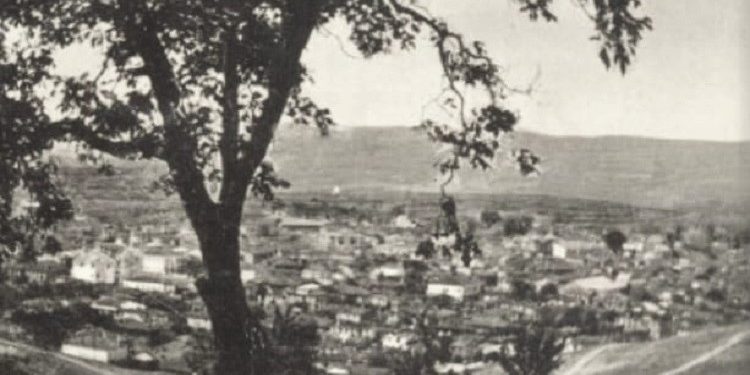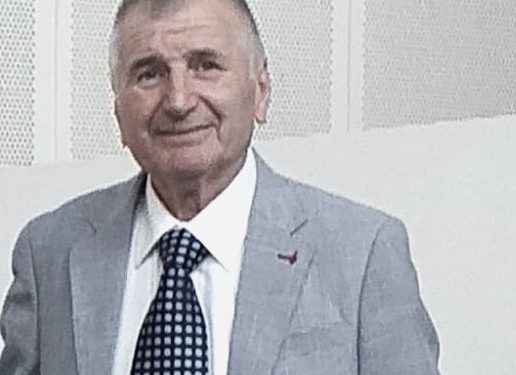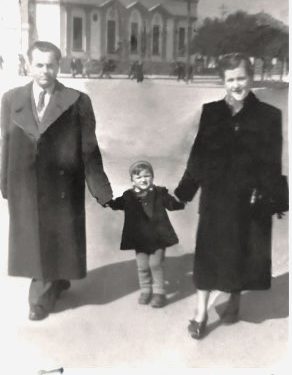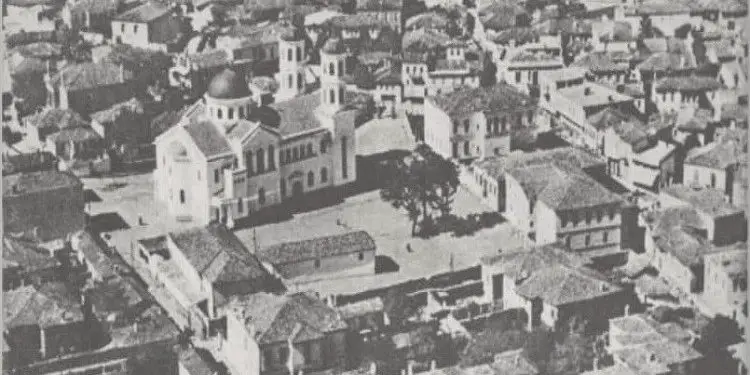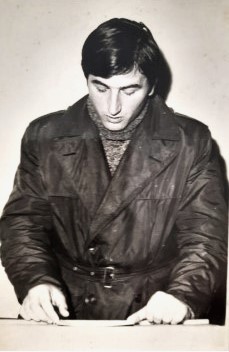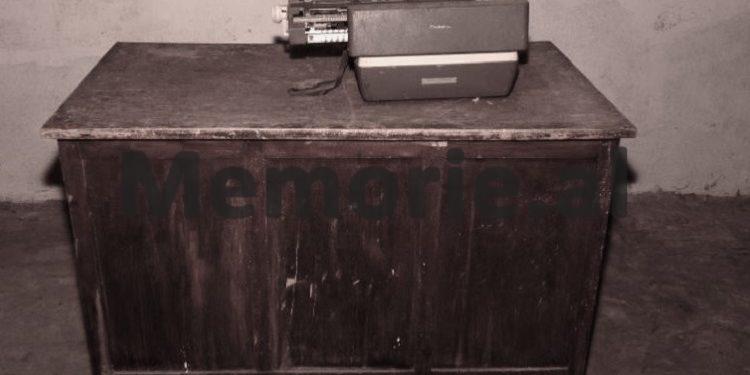By Nestor Topencharov
The seventh part
THE DRAMA OF LIFE
(THE STORY OF A FAMILY)
I dedicate this book to: All fellow sufferers. Their families. And in particular, to people who did not have the opportunity to tell the odyssey of life, during the communist dictatorship.
FOREWORD
Memorie.al / I were born in the city of Korça, on October 22, 1953. I left Albania in October 1990, after we were given the right to repatriate to Yugoslavia (now North Macedonia) ). In June 1992, I immigrated to Italy, where I still live today. Although I have been away for 32 years, I did not cut ties, as Albania was the country of my birth, where I spent 37 years, and that part of my blood is Albanian. Years later, the ties with Albania were strengthened, as I also took my wife from Durrës. We came every year on vacation, but the short time of our stay meant that many contacts were cut off. However, true friends and comrades remained forever in my heart.
In the last three years, I did not have the opportunity to visit Albania. But during 2022, I came several times. My commitment on the one hand and the coincidence on the other, made it possible for me to re-establish connections with friends and colleagues whom I had not seen for decades. Knowing my past, some of them advised me to write down what had happened in my life. At first, this idea seemed like a utopia to me, since even though I had been a good student; I had no inclination towards drafting. Then I reflected. I would just write my story, true events, where not much inspiration was needed. Perhaps a writer would know how to present these events, as a true pen artist knows. While I will write them, without many descriptions: briefly, simply, naked, as they happened.
Something else that pushed me even more to write this book was an interview on TV Klan, which I saw in October of this year, directed by the well-known journalist Blendi Fevziu. I didn’t seek revenge. But I didn’t even have justice. With the help of this book, I will make known to the Albanian public opinion, the role of the individuals who contributed to my suffering and that of my family. And today, I am putting my finger on these “beings”, not for the task they had, but for the way they performed it. I will start my writing with my grandfather, from my mother’s side, to continue with my father, where I will touch on the most important moments of their lives. This will help the reader to know my background.
Then I will also talk about myself. In this book I will also tell some events, one more dramatic than the other, that happened to people I had the honor of knowing. I am glad that many books have been published on the suffering and persecution of “enemies of the people” and their families in internment camps and prisons during the communist dictatorship. I was able to read some of these works. I believe that this book, in a modest way, will contribute to know even more the inhumane methods of the State Security, the way they created accusations and how they destroyed people and families to keep the people under terror.
Author
December, 2022
CHAPTER TWO
When I was in Spaç, I was shown a case, also quite interesting, where the court had tried to show its honor here as well. At that time, there was Rakua, an old man who worked as a driver, in the Korça branch. A simple man. One day he had left a bar, where he had poured a couple of glasses of brandy. As he seems a little confused, he had loudly expressed his displeasure.
They arrest him and after keeping him in the dungeon for a while, his interrogator sends him to prison, since they had nothing to discover from such a character. Those days, the head of the Investigation, Reshati, came to visit the dungeon. After seeing the situation in the prison and exchanging two or three words with the detainees, he was directed by Rakua, thinking that he had been punished. – “Seven years”, – he said.
But Rako had not yet appeared in court. Then Reshat realized the mistake and with a quick spin, came out. Everyone gathered around Rakos and the experts told him that the boss is waiting for the suit. They will give seven years. When Rako appeared in court, his ideas were clear. The judge’s question about his silence was answered that; his sentence was decided. That trial was in vain. He would be sentenced to seven years and that was what the boss had told him. In the hall, people began to murmur. The jury quickly retreated. They returned to the hall after a few hours, until they got in touch with the Internal Affairs bodies.
They would punish him for seven years, Rako said. You gave more was not the case. Then they sentenced him to 5 years. In dungeon they congratulated him for the intelligence he showed. I met Rako in Spaç. He was a good man, a wise man. I remember in the winter time, when together with many old fellow-sufferers, they stood in a corner, sheltered from the cold wind, between the shop and the account office, where at lunch time there was, for a while, the sun.
After the decision of that session, which was taken by the court, the hall was emptied. One of the policemen went to inquire about the vehicle. The prosecutor approached me and politely proposed that I accept the charge at the next hearing. That it would be for my benefit and he would ask that I be punished less. I remained indifferent and did not reply. I don’t know how he got my attitude.
After a week, when I was brought out again, the prosecutor read the indictment in a calm voice, quite different from the tone he used the first time. After the negative answer from my side, for not accepting the accusation, he got nervous and started raising his voice, just like in the first session. This time the courtroom was so full that you had nowhere to throw the apple seed. In the second row, there was my mother with my sister, and in the first, I saw one of my childhood friends, Petro Fil. Even today I remember the pity in his eyes, for what I was suffering in life. He was the son of a family with many members, who have always expressed their love and respect for us.
During the course of the trial, the sister stood up and began to accuse the false witnesses. The judge intervened and ordered her to sit down, but she continued the accusations. Then he threatened him, first with the removal of the word, then with the order to take him out of the hall and, finally, if he did not rest, he would punish him with 15 days of imprisonment. But Ivana managed to say what she had to say. Among other things, you had asked the jury that the trial should take place at the faculty. Where all the students of the course would express themselves about me and about these slanderers, who were testifying against me, and clarify what they had to do with me.
Deserted sister, she took her word to protect me even risking prison. But my fate was decided. Then the prosecutor read the claim, where he demanded 7 years of deprivation of liberty and 5 years of deprivation of electoral rights. After the judge’s question,; “what was I looking for” and with my answer, “justice”, this session was also closed.
They brought me back to the courtroom, after two days. When the judge read the verdict, the text was verbatim, as was the claim. The only addition was, that; “I did not hesitate to provoke the witnesses”. During the trial, I pointed out to one of the witnesses that the accusations she made against me were not the same as those of her friend, which she had transmitted to her.
On April 15, 1977, I was sentenced as it was decided, with 7 years in prison and 5 years of electoral disqualification, according to Article 73/1, for agitation and propaganda. After the decision, I was put in handcuffs and surrounded by policemen; they were taking me in the direction of “Gaz”. When we were going down the steps of the courthouse, which were packed, I remember the sight of my mother, with her hair blown by the wind.
He broke through the crowd and came in front of me, addressing me with a strong voice: – “It’s okay, son! The important thing is that we are honest”. At this moment, one of the policemen pushed him away and we continued towards the car. These words of my mother gave me strength. At that moment, it was not easy for a 23-year-old young man to think that 7 years of his youth, one of the most beautiful of his life, would be spent in prison!
The next day I was informed that my mother had requested to appeal to the Supreme Court. Although I did not agree, I agreed, so as not to break his wounded heart. They took me to the court once more, to an administrative office, where one of the secretaries prepared the appeal.
This request meant that until the answer came, they continued to keep me in the dungeon and did not meet me with my family. After the court decision, they left me alone. No one came to tear my boards anymore. The investigation was over, I was convicted, and justice had triumphed.
One morning the door of the dungeon opens and an old man enters me. It had similar features, with the French artist, Jean Gabin. I remember the movie “Les Miserables”, where he played the role of Jean Valjean, based on the novel of the same title, by Victor Hugo. His name was Andrea. He had worked in dairy warehouses. With it, they left me about three or four weeks. He was a good man. He also knew my father.
In company with him, I spent time “very well”. He told me many episodes of his life. He used to cook. Something he learned when he was young, working with an Armenian chef. During the War, he had been a partisan. For a long time, he had worked as a storekeeper at the dairy, where he had a great time, in the company of a colleague named Kita, who had also been arrested. At first, the charge for them was very serious: sabotage.
Then it came back: for damage to socialist property. The accusation was based on the lack of empty boats, in the inventory made. They had calculated their value very high. Like anything that goes out of use, these wooden floats had their lifespan. The mistake of the storekeepers was that during these years, these half-rotten floats, not only did not make it out, but they were no longer found. In the winter period, they were used for heating.
Kita had been a social, chatty and joking person. The security wanted to punish him for agitation and propaganda. Hetusia did his best to convince Andrea to testify against his colleague, promising that they would give him a small sentence, two or three years at most. But they did not succeed, because they had to deal with an honest man. At that time, Andrea and his friend were on the verge of trial. They punished them severely.
One morning, the door of the dungeon opened and in front stood the head of the investigation, with a large person, who introduced himself to us as the head of the Branch. He wanted to know about the conditions we lived in. We both told him that we didn’t have any requests. The adjacent gate opened behind us. In the area of the dungeons it was very quiet and the smallest noise could be heard. Often to break the monotony, when the policemen came to deliver the meals, we approached the door to hear their voices. That’s how we did it this time. After the chairman asked the standard question, a faint voice came from inside the cell, which seemed to be complaining about something. Reshat immediately intervened, addressing his superior: – “Comrade Chairman, what does he want?” Don’t you want a tourism room?!
After these words, the cell door was closed and they were directed to another dungeon. Even in this case, what hypocrisy! On the one hand they asked if you needed anything, and on the other hand they mocked you.
Andrea told me that, for a period, he had been with a villager from the deep areas of the Korça mountains, who had been accused of agitation and propaganda. Mehmet, the name of the victim. The night before, he had been guarding the choir. The next day, after lunch, two of his fellow villagers asked him to replace them in the night service, as they had a wedding in the village.
Mehmeti did not accept, since last night, he had spent without sleep and this night, he wanted to rest. When they saw that they could not convince him, one of them provoked him, saying that he; if he didn’t do this service, he didn’t love the party and Enver. – “Leave me alone, don’t break my head”, – was Mehmet’s answer.
These, angry that they would not be at the wedding, accused him to the guard officer of the ward. The officer, a piece of ignoramus, had tied Mehmet with a wire and to the department car, had taken him to the Korça Branch. The accusation that he insulted the party and Enver, caused the desert to crack inside him, even though he tried to explain that he was not at fault. For accusations of this nature, at that time they did not accept any justification.
Data were immediately requested from the chairman of the united cooperative. In those deep areas, the villages were small and that’s why they were united. The chairman of the United Cooperative did not know Mehmet, but when he found out that he was accused of agitation-propaganda, he gave him the origin of kulak and ballista. This document ultimately decided Mehmet’s fate.
They called the chairman of the People’s Council of the village, who knew the fellow villager and his family well, to the court. During the testimony before the jury, another truth emerged. Mehmet’s family, not only had not been kulaks and ballistas, but had had a martyred uncle and a partisan brother. It was true that he did not work regularly in the cooperative, but they had let him go free, as the needy that he was.
There was a reed cart. So he who in the morning took the hammer and trowel, sometimes a wall, sometimes a roof or fence, from one village to another, and at dinner he brought the bread to the children. Then when the judge asked him, he stated that the two witnesses had attended the wedding of one of their nephews that night. This confirmed what Mehmet was saying.
But even in this case justice did not work. Mehmet was sentenced to three years in prison. Another innocent, they would separate him from his family, they would deprive him of his freedom. I met him in Spaç. He was a wise man. I felt sorry when I thought about his numerous families in poverty, about those children, who at dinner were waiting for their father to break the plate of bread.
Now I will talk a little about the policemen who served in the dungeons. The commander was a thin, tall policeman with a very pale face. It seemed as if all his life, he had not seen the sun. Although he was not old in age, his face was full of wrinkles. His name was Haxhi, but everyone called him Xhike. Another policeman was Kozmai (Kozi), a man with a very serious face, but who behaved well with the prisoners.
It was he who put the irons on me and took me to the dungeon, the day Heraclius ordered my arrest. Rexhepi (Xhepi), was the oldest of them all, with soft blue eyes. When I was in dungeon, he addressed pickpockets with advice, to put them on the right path, as if they were his children. Even Nevzat was a good man and when we came out of the dungeonto carry out the actions, many of the chunas would gather around him and make jokes.
Qemali was small and very bad-tempered. The rest of the staff was made up of young men who did compulsory military service in the police. The latter stood guard in shifts always locked in the great corridor in the middle of the dungeons. Usually the old policemen rarely did 8 hours duty. They were engaged during the time, when meals were served and we went to the bathroom, to accompany us to the investigator and, during the judicial process. In the latter, young policemen also took part.
I remember that the second time, when I was taken to court, I was accompanied by Qemali. After the claim had been given and the hall was empty, Qemali approached me and told me that; I, the student, had a little over 7 years of the prosecutor, “wishing” that the judge would add them to me. While the third time, when the decision was given, Rexhepi accompanied me. After the sentence, when the young policeman went to inquire about the vehicle, Rexhepi expressed his regret that “it had been many years”.
For almost 8 months that I was kept in the dungeon I was not given the opportunity to go outside. My ventilation was that inner corridor, where on one side there were two bathrooms, of course without doors, where we stayed for a few minutes, for physiological needs. What I noticed was that the police did not care if you were accused for political or ordinary reasons. For them, it was important that the time of eating food, and especially that of the WC, were as fast as possible, so that they could leave as soon as possible, from that heavy environment.
Sometimes Jike’s voice could be heard yelling at someone who was late to the bathroom. We from the dungeons were taken out one by one. When one ended, the door of the other was opened, since people from different dungeons should not see each other. During those months, I used to listen to the door so I wouldn’t hear my father’s voice. I often glanced at the shoes that were in front of the dungeon gates. But it was in vain, since in such cases the family members separated them in the dungeons of different palaces. After they finished with us, they took out the buckets.
In this block, there were two buckets. Each dungeon had about 15-20 people. Most of them were ordinaries, but there were also politicians who had received the final punishment. In those moments, a great noise would begin, as if you were in a shopping mall. Even the policemen laughed and teased the young chunas (most of them were pickpockets). In general, these old policemen behaved well with everyone. I had no problems either. I performed the actions in the bathroom quickly and thus I had no conflicts with the police.
They gave us food in plastic plates. These plates were depicted by countless scratches. Their sides were colored, from the tomato sauce. Along with the plate, they also gave us an aluminum spoon. Memorie.al




